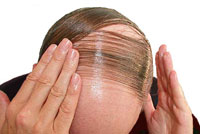People lose hair because of male sex hormones, stresses and pregnancy
Everybody loses their hair. In some cases, alopecia or baldness occurs in a rather slow way; people get old yet still have some hair to be done by a hairdresser on a regular basis. Others start going bald or having thinning hair in their early twenties. What are the causes of alopecia? Scientists came up with at least eight reasons which prompt hair to fall out.

Male sex hormones
One out of three men is affected by the hair loss associated with testosterone, the principle male sex hormone. The point is that one third of males have hair which is too sensitive to DNT, a variety of testosterone. The age bracket of those males varies from 30 to 60 i.e. they can start losing their hair while being relatively young or fairly old. Their hair begins to thin and fall out due to the effects of DNT. There are three treatments available at the moment.
Hormone therapy: it is believed that the use of certain hormones can hinder production of DNT. However, therapy can yield good results only when patients take the drugs for years. Besides, doctors are still unaware of the long-term consequences of this kind of treatment.
Surgery: transplantation of hair and hair follicles from the back of the head or other parts of the body to the bald patches of the scalp.
Topical lotions: medications containing minoxidil are applied to the problem spots in order to slow down the active hair loss by improving blood circulation of the hair follicles. The procedure should be carried out for a long period of time. Anyway, it is not considered a cure for complete baldness.
What causes some men and women to lose their hair? Some of the causes include:
Stress
A state of constant stress may bring about specific hair loss. Feeling the strong effects of stress or shock is thought to cause hair to fall out some 2-3 months after a stressful event. The condition is associated with increased levels of testosterone and noradrenalin, a hormone secreted by the medulla of the adrenaline gland in response to a stressful situation. Patients are recommended to take certain tests to examine the skin of the scalp. The intake of vitamins and mineral salts is one of the options. People affected with alopecia may sometimes benefit from psychotherapy.
Pregnancy
Some women may sport beautiful heads of hair during pregnancy because their levels of female sex hormones (estrogens) increase dramatically. However, hair starts to fall out in 2-4 months following childbirth. The estrogen levels get back to normal.
No treatment is required if hair recovers its regular appearance in several weeks after childbirth. Those who keep losing their hair will probably have to wait for 6-8 months until their hair starts to regrow. They are recommended to speed up the recovery by taking vitamins containing iron, magnesium and calcium. The intake of vitamin B6 is also highly beneficial.
Thyroid gland
Excessive hair loss may be related to either hyperactivity of the thyroid glad or its malfunction. The shedding of hair usually stops following hormonal therapy.
Alopecia areata
Alopecia areata or spot baldness is believed to be an autoimmune disease in which the body treats its hair follicles as foreign bodies and suppresses hair growth. Treatment is by steroid injections or creams administered for many months.
Androgenetic alopecia
Androgenetic alopecia may occur in women in an age group ranging from 18 to 44. This kind of hair loss is associated with increasing age. Hair is shed due to increased activity of DHT in the female body. As a rule, the disease does not result in complete hair loss. Hair on the scalp grows thinner; the parting looks wider and a small bald spot on the crown of the head is more noticeable. The same drugs and procedures can be used for treating both common baldness in men and androgenetic alopecia in women.
Menopause
The cessation of ovarian function (estrogens and progesterones are no longer secreted) leads to an increase in the level of male sex hormones in the female body. Women also experience emotional disturbances. As a result, hair starts to fall out. Hormone replacement therapy is claimed to be efficacious in treating this form of baldness.
Chemotherapy
Hair growth is suppressed following the use of chemotherapy. Patients start losing their hair but the process stops and hair grows back after treatment is complete. Radiotherapy or therapeutic radiology used for treating cancer can cause irrecoverable hair loss only if beams of radiation are directed at the skin of the head.
Subscribe to Pravda.Ru Telegram channel, Facebook, RSS!

